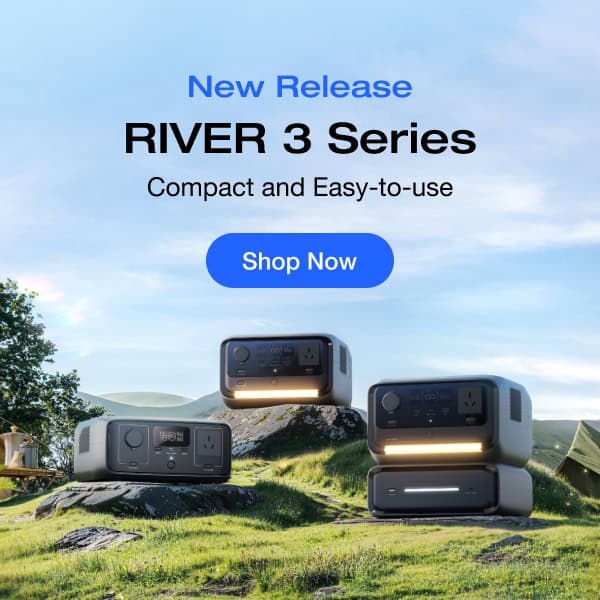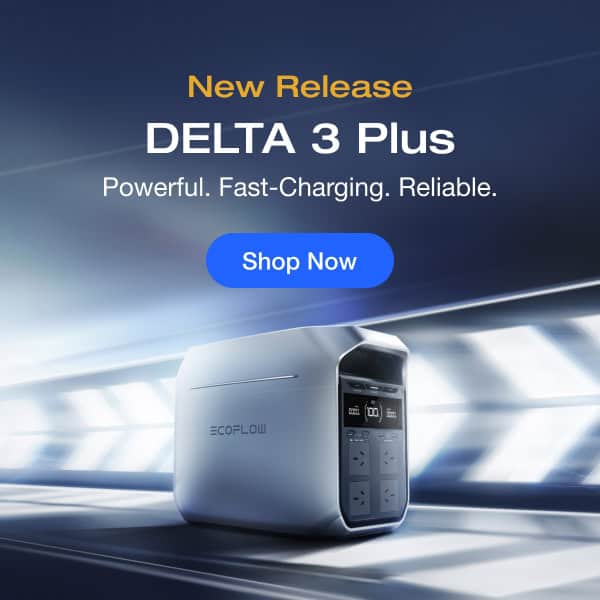When you think of solar power, you probably think of large panels on a rooftop. While this describes some residential and commercial systems, you may have more modest needs. A smaller, 100W panel can power several personal devices like smartphones, laptops, and some small appliances.
A 100W panel comes at a lower price point, and it’s easy to carry with you to provide off-grid electricity for a camping trip. If you’re new to solar power, a 100W photovoltaic (PV) panel is an inexpensive entry point for introducing clean, renewable energy to your life.
But is 100W sufficient for your electricity consumption needs?
Find out in this guide.

How Much Energy Does a 100-Watt Solar Panel Produce?
When a solar panel has 100W of rated power, its output under optimal conditions is about 100 watts in an hour. It’s crucial to note that the full rated power of 100W is achieved in a laboratory using Standard Test Conditions of 1000W/m2 of sunlight, AM1.5, and an air temperature of 25°C (77°F.)
Such ideal conditions are rarely found in the real world. Numerous environmental factors like shade, temperature, panel angle, and cloud cover often prevent a PV panel from generating its full rated power. Depending on these and other factors, you can expect anywhere from 25W of electricity per hour from a 100W solar panel on a cloudy day and +/- 90W in bright summer conditions.
Most areas regularly receive anywhere from 3-5 hours of peak sunlight daily. When you factor in other environmental considerations, a 100W solar panel will produce 400W of electricity on average on a sunny day. 300-600 watt-hours (Wh) of energy in a single day.
What if the PV Panel Is Not Operating Under Optimal Conditions?
As noted above, the rated power of a solar panel represents the maximum wattage it can deliver. Solar panels are rated based on laboratory conditions, which rarely occur in the real world.
Several factors — some of which you can mitigate — will reduce the efficiency and the output of your panel:
- Shade. If trees or other obstructions block even a portion of the sunlight your 100W panel receives, you will generate less than the rated power. With portable solar panels, this is an easy fix. Simply move the panel into direct sunlight.
- Dirt. Dust, dirt, and debris can block your panel from absorbing sufficient sunlight. Clean your solar panels with a soft cloth, distilled water, and gentle, biodegradable soap. Never use harsh chemicals to clean PV panels.
- Heat. Somewhat counterintuitively, high temperatures actually diminish the production of solar panels. If the surface temperature of your panels exceeds 95°F (35°C), it will have a noticeable effect on output. Solar panels typically operate best in warm to mild temperatures but will still generate electricity even in extreme cold or heat. Outdoor temperatures between 59°F and 95°F degrees (15°C – 35°C) are best for solar panel efficiency. But aside from changing your location, there’s not much you can do about that.
- Angle. Correctly angling solar panels allows photovoltaic cells to receive the maximum possible amount of direct sunlight daily. For fixed rooftop installations using rigid solar panels, a 30°- 45° angle facing true south is typically best for locations in the northern hemisphere. Depending on the panel, you may be able to purchase a solar tracker to adjust the angle during the day automatically. Another advantage of portable solar panels is that you can easily adjust the angle to follow the sun’s path.
Be sure to maximise solar energy capture as much as possible during the day and store it in a portable power station or other balance of system. You’ll also need to determine your required energy consumption between charges to ensure you have enough solar panels with sufficient rated power to meet your requirements.
100-Watt Solar Panel Specifications

EcoFlow 100W Rigid Solar Panel
The EcoFlow 100W Rigid Solar Panel is a monocrystalline panel that converts an industry-leading +/- 23% of direct sunlight into electricity. Connect it to a portable power station like the RIVER 2, and you can recharge it using the 100W solar panel in as little as 3 hours.
The RIVER 2 has four charging options and multiple output ports. Using AC (household) electricity, the RIVER 2 recharges in just 60 minutes — 5x faster than other portable power stations.
The rigid 100W solar panel has pre-drilled holes for easy mounting on your motorhome, van, or roof. With an IP68 waterproof rating and highly durable construction, EcoFlow’s rigid PV panel will provide reliable off-grid electricity for decades.
- Weight: 13.7 pounds (6.3 kilograms)
- Weather Rating: IP68
- Dimensions: 38.6 x 23.1 x 1.2 inches (98 x 58.6 x 3 cm)
- Rated Power: 100W (+/-5W)
- Open Circuit Voltage: 20.3 volts (Vmp 17.1V)
- Short Circuit Current: 6.3 amps (Imp 5.9A)
- Efficiency: 23%
- Cell Type: Monocrystalline Silicon

EcoFlow 100W Flexible Solar Panel
The EcoFlow 100W Flexible Solar Panel is a lightweight, thin film option designed to fit the curve of a motorhome or van and other irregular surfaces. It’s 70% lighter than traditional solar panels and has an incredible bending capacity of up to 258 degrees.
Unlike many thin film panels, EcoFlow’s flexible solar panel also has a 23% efficiency rating. Like the rigid panel, it’ll perform well even in overcast conditions. Thanks to its highly durable design and painless installation, you can use the panel worry-free for years.
- Weight: 5.1 Pounds (2.3 kilograms)
- Weather Rating: IP68
- Dimensions: 41.5 x 24.1 x 1.0 inches (105.5 x 61.2 x 2.5 cm)
- Rated Power: 100W (+/-5W)
- Open Circuit Voltage: 20.3 volts (Vmp 17.1V)
- Short Circuit Current: 6.3 amps (Imp 5.9A)
- Efficiency: 23%
- Cell Type: Monocrystalline Silicon

EcoFlow 110W Portable Solar Panel
The EcoFlow 110W Portable Solar Panel is built for life on the go. For camping and other outdoor activities, it’s by far the most versatile option for off-grid electricity generation.
This portable solar panel is foldable, lightweight, and waterproof. It delivers 10 additional watts of rated power than the above options, but it’s lighter than the rigid solar panel and much more compact than the flexible PV panel. EcoFlow’s 110W portable solar panel is 10% smaller than comparable solar panels on the market.

With a built-in kickstand, the panel is self-supportable and comes with a durable carrying case.
For most use cases, EcoFlow’s 110W portable solar panel is the best option available in the 100W rated power range.
- Weight: 8.8 pounds (4 kilograms)
- Rating: IP68
- Dimensions: 20.2 x 62.5 x 0.8 inches (178.5 x 42 x 2.5 cm)
- Rated Power: 110W (+/-5W)
- Open Circuit Voltage: 21.7V (Vmp 18.5V)
- Short Circuit Current: 6.3A (Imp 6.0A)
- Efficiency: 23%
- Cell Type: Monocrystalline Silicon

What Appliances Can You Run With a 100-Watt Solar Panel?
The rated power of any solar panel is only one factor in which devices and appliances it can run. Solar panels do not provide electricity directly to your devices. Instead, the solar energy captured by the panels must be converted and stored in a portable power station that supports solar charging or other balance of system.
Let’s use the RIVER 2 portable power station as an example. It offers a maximum solar charging capacity of 110W — a perfect match for any of the abovementioned panels.
Depending on the amount of available sunlight and other environmental conditions, the RIVER 2 can fully recharge from 0-100% in as little as three hours. It offers 256Wh of electricity storage and up to 600W AC power output using X-Boost.
That means it can run up to 99% of consumer electronics like smartphones, tablets, laptops, and televisions. If you’re going off-grid, it can also power LED lights and small appliances, like a coffee maker or hotplate.
If your electricity consumption needs are higher, you’re better off purchasing a solar panel with higher rated power — like EcoFlow’s 220W Bifacial Portable Solar Panel. Connect it to a portable power station with more solar charging, storage, and AC output capacity, like the EcoFlow DELTA 2.
Determining your electricity consumption requirements is the most crucial step in making an informed purchase decision for a solar power solution that will meet your needs.
The RIVER 2 with 110W portable solar panel is the perfect solar generator for life on the go. But if you’re looking for a whole home generator, you’ll need multiple solar panels and a much bigger portable power station like the EcoFlow Delta Pro.

How Many Amps Does a 100-Watt Solar Panel Produce?
The amperage of a solar panel measures the flow of electric current. EcoFlow 100W and 110W solar panels produce between 6.3 – 6.5 Amps of current. This is about half what 400W solar panels can produce. Connecting solar panels to your solar batteries or a portable power station allows you to store the amperage to run your personal devices and small appliances.
Frequently Asked Questions
A typical house needs 5-10kW of electricity output from a solar array to operate essential appliances. You’d need at least 60-120 100W panels to achieve that level of production. While technically possible, it won’t be cost-effective and will require an inordinate amount of rooftop space. Using 400W solar panels and fewer of them to power your home would be far more efficient.
A 100-watt solar panel is worth purchasing to charge and run consumer electronic devices like smartphones and small appliances off-grid. It offers clean, renewable electricity that you can take anywhere. 100W solar panels are inexpensive. It requires very little investment for a consistent off-grid power source that’ll last for decades.

Final Thoughts
A 100-watt solar panel provides a terrific entry point for people new to solar power. It’s also ideal for backpacking, camping, and other outdoor activities where size and weight are primary considerations.
Solar panels in the 100W range don’t make sense for powering your entire house except as a possible addition to an array comprised mostly of higher-wattage PV panels.
But when you want to generate off-grid power for a road trip or as a backup for essential personal devices, the size is just right.
Whatever your off-grid electricity needs, EcoFlow offers solar panels designed to power your sustainable lifestyle. Check out our solutions today.


